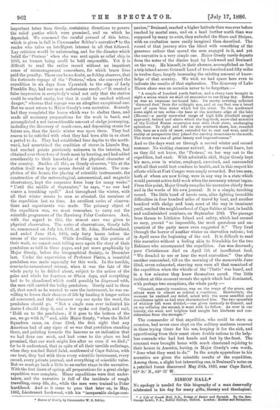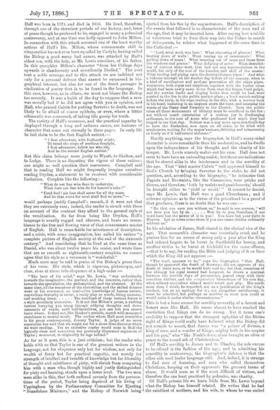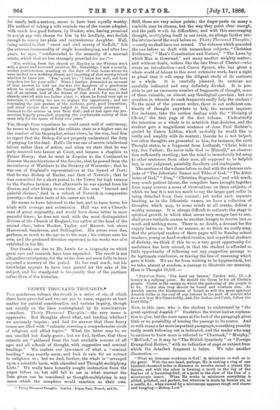BISHOP HALL.*
No apology is needed for this biography of a man deservedly celebrated in his day for many gifts, literary and theological.
• A Life of Joseph Hall, DD.. Bishop of Exeter and Norwich. By the Rev. George Lewis, P. A, Balliol College, Oxford. London : Hodder and Stoughton.
Hall was born in 1574, and died in 1656. He lived, therefore, through one of the stormiest periods of our history, and, lover of peace though he professed to be, engaged in many a polemical controversy, and at one time was hotly opposed to John Milton. In connection with this attack occurred one of the least worthy actions of Hall's life. Milton, whose consummate skill in vituperation has not even been equalled by Carlyle, having called the Bishop a good many bad names, was attacked by Hall's eldest son, with the help, as Mr. Lewis considers, of his father. In this pamphlet Milton's character "from his College days upwards is slanderously and scurrilously libelled." The poet took a noble revenge, and to this attack we are indebted not only for a personal defence that cannot be surpassed in bio- graphical interest, but also for one of the finest passages in vindication of poetry that is to be found in the language. In this case, however, as in others, we must not blame the Bishop too severely. It was a habit of the day to suppose that a man was morally bad if he did not agree with you in opinion, and Hall, who praised Calvin for putting Servstus to death, was not likely to be afraid of coarse epithets, or even, where a bitter schismatic was concerned, of taking idle gossip for truth.
The variety of Hall's resources, and the practical sagacity he displayed through a long and arduous career, are features of character that come out strongly in these pages. In early life he laid claim to be the first English satirist :—
" I first adventure, with foolhardy might, To tread the steps of perilous despight, I first adventure, follow me who list, And be the second English satirist."
But this claim belongs more justly to Wyatt, to Skelton, and to Lodge. There is no disputing the vigour of these satires ; one might as well question their coarseness. Campbell said that in reading Hall we might frequently imagine ourselves reading Dryden, a statement to be received, with considerable limitation. Couplets like the following :—
"What do not fine wits dare to undertake,
What dare not fine wits do for honour's sake ?"
"Fond fool ! six feet shall serve for all thy store, And he that cares for most shall find no more."—
would perhaps justify Campbell's remark, if it were not that they are extremely rare ; indeed, the reader is struck with them on account of the contrast they afford to the general style of the versification. So far from being like Dryden, Hall's language is usually rugged and obscure, and bears no resem- blance to the free and flowing verse of that consummate master of English. Hall is remarkable for minuteness of description, and a critic, with some exaggeration, has called his satires "a complete picture of English society at the end of the sixteenth century." And considering that he lived at the same time as Daniel, who was about twelve years his senior, and wrote lines that are as smooth as eighteenth-century couplets, we cannot agree that his style as a verseman is "wonderful."
Mach more may be said in praise of the Bishop's prose than of his verse. His style, which is vigorous, picturesque, and clear, rises at times into eloquence of a high order :—
" The bent of his mind," says Mr. Lewis, "was undoubtedly towards the imaginative, the poetical, and the concrete, rather than towards the speculative, the philosophical, and the abstract. At the same time, all the resources of the rhetorician and the skilled debater were at his command, an instinctive knowledge of human nature, marvellous dexterity in retort a ready play on words, biting sarcasm, and mocking irony 'The resultant of these various forces is
a style peculiarly attractive It is not like Milton's prose, a rushing
torrent hurrying you along through eddying thoughts and down cataracts of words, until half-breathless, you are left you scarce know where. It does not, like Hooker's periods, march with measured stateliness to mental music. The author whom Hall most resembles is his great contemporary, Jeremy Taylor. A judge of no mean reputation has said that we might not for a short time discover which we were reading. Yet an attentive reader would miss in Hall the logically close and somewhat too poetically illustrated argument of Taylor ; moreover, in originality he lags behind."
As far as it goes, this is a just criticism ; but the reader who holds with us that Taylor is one of the greatest writers in the language, not for eloquence only but for wisdom, not only for wealth of fancy but for practical sagacity, not merely for strength of intellect and breadth of knowledge but for liberality of thought and saintliness of piety, will shrink from comparing him with a man who, though highly and justly distinguished for piety and learning, stands upon a lower level. The two men were alike in this, that both suffered severely from the persecu- tions of the period, Taylor being deprived of his living of Uppingham by the Parliamentary Committee for Ejecting "Scandalous Ministers," and the Bishop of Norwich being ejected from his See by the sequestrators. Hall's description of the events that followed is so characteristic of the man and of the age, that it may be inserted here. After saying how a rabble of volunteers tried to force their way into the Palace in search of delinquents, he relates what happened at the same time in the Cathedral :— "'Lord, what work was here ! What clattering of glasses ! What beating down of walls ! What tearing up of monuments ! What pulling down of seats ! What wresting out of irons and brass from the windows and graves ! What defacing of arms ! What demolish- ing of curious stone-work, that had not any representation in the world, but only of the cost of the founder, and skill of the mason ! What tooting and piping upon the destroyed organ pipes ! And what a hideous triumph on the market day before all the country, when in a kind of sacrilegious and profane procession all the organ pipes, vestments, both copes and surplices, together with the leaden cross which had been newly sawn down from over the Green.Yard pulpit, and the service books and singing books that could be had, were carried to the fire in the public market-place ; a lewd wretch walking before the train, in his cope trailing in the dirt, with a service book in his hand, imitating in an impious scorn the tune, and usurping the words of the litany used formerly in the Church. Near the public cross all these monuments of idolatry must be sacrificed to the fire ; not without much ostentation of a zealous joy in discharging ordinance, to the cost of some who professed how much they had longed to see that day. Neither was is any news upon this Guild-day to have the Cathedral, now open on all sides, to be filled with musketeers, waiting for the mayor's return, drinking and tobacconing as freely as if it had turned alehouse."
Hardly anything, says the biographer, in Hall's many-sided character is more remarkable than his moderation, and he dwells upon the independence of his thought and the charity of his temper. Mr. Lewis scarcely makes out his case. Hall does not seem to have been an unbending zealot; but there are indications that be shared alike in the intolerance and in the servility of the age. That "kind master Calvin" well approved himself to God's Church by bringing Servetas to the stake, he did not question, and, according to the biography, "he intimates that Papists and Brownists, like the Canaauites, were pricks and thorns, and therefore, both by mulcts and punishments,' should be brought either to yield or avoid.'" It cannot be denied, says Mr. Lewis, that Hall was a good Churchman ; and if extreme opinions as to the virtue of the priesthood be a proof of that goodness, there is no doubt that he was one :—
"lie that can save you without us," he said in one sermon, "will
not save you but by us Woe be to you, therefore, if our word have lost the power of it in you! You have lost your right in Heaven. Let us never come there if you can come thither ordinarily without us."
In his adulation of James, Hall shared in the clerical vice of the age. That monarch's character was essentially cruel, and he praises him for an excess of mercy only a year after the King had ordered Legate to be burnt in Smithfield for heresy, and another victim to be burnt at Lichfield for the same offence, —that is to say, for reading the Bible and judging of it on lines which the King did not approve :—
"The truth appears to be," says the biographer, "that Hall, though he approved the death of Servetus, did not approve of the death of these men, or he would have said so; bat that, consoions of the obloquy his royal master had incurred, he draws a contrast between the terrible days of persecution, passed away with their countless victims, and the comparatice blessedness of his own day, when solitary executions stirred men's wrath and pity. His words must thus, I think, be regarded, not as a justification of the King's conduct, but as an apology for it ; not altogether satisfactory, it must be admitted, but perhaps as truthful as most men could or would make it under similar circumstances."
This is but a lame excuse for servility unworthy of a devout and honest man like Hall. He seems almost to have reached the conviction that Kings can do no wrong. Yet it taxes one's credulity to suppose that the strongest upholder of the Divine right of Kings could really have believed what the Bishop did not scruple to assert, that James was "a prince of divines, a king of men, and a wonder of Kings, mighty both in his sceptre and his pen," who "like Noah's dove, alone brought an olive of peace to the tossed ark of Christendom."
Of Hall's servility to James and to Charles, the sole excuse to be offered is the fashion of the age ; and in admitting his scurrility in controversy, the biographer's defence is that the other side used fouler language still. And, indeed, it is strange to find men of learning, and men who called themselves Christians, heaping on their opponents the grossest terms of abuse. It would seem as if the most difficult of virtues, and therefore the one least practised by polemics, was charity.
Of Hall's private life we learn little from Mr. Lewis beyond what the Bishop has himself related. He writes that he had the saintliest of mothers, and his wife, to whom he was united
for nearly half-a-century, seems to have been equally worthy. His method of taking a wife reminds one of the course adopted, with much less good fortune, by Hooker, who, having promised to accept any wife chosen for him by his landlady, was foolish enough to marry her plain and cantankerous daughter. Hall, being settled in that "sweet and civil county of Suffolk," felt the extreme incommodity of single housekeeping, and after two years, he says, "condescended to the necessity of a married estate, which God no less strangely provided for me
"For, walking from the church on Monday in the Whitsun week with a grave and reverend minister, Mr. Grandidge, I saw a comely, modest gentlewoman standing at the door of that house where we were invited to a wedding-dinner, and inquiring of that worthy friend whether he knew her. quoth he ; I know her well, and have bespoken her for your wife.' When I further demanded an account of that answer, be told me she was the daughter of a gentleman whom he mach respected, Mr. George Winniff, of Bretenham ; that out of an opinion had of the fitness of that match for me, he had already treated with her father about it, whom he found very apt to entertain it, advising me not to neglect the opportunity; and not concealing the just praises of the modesty, piety, good disposition, and other virtues that were lodged in that seemly presence. I listened to the motion as sent from God ; and at last upon due pro- secution happily prevailed, enjoying the comfortable society of that meet help for the space of forty.nine years."
Yet, though from experience he could speak well of matrimony, he seems to have regarded the celibate state as a higher one, to the comfort of his biographer, whose views, by the way, lead him to regret that the Bishop did not properly understand the duty of praying for the dead. Hall's life was one of severe intellectual labour rather than of action, and when we state that he was early received into favour at Court, and became a chaplain to Prince Henry ; that he went in disguise to the Continent to discover the machinations of the Jesuits; that he passed from the incumbency of Waltham to the Deanery of Worcester ; that he was one of England's representatives at the Synod of Dort; that he was Bishop of Exeter, and then of Norwich ; that he was committed for a short period to the Tower for high treason by the Puritan faction ; that afterwards he was ejected from his diocese, and after living to see three of his sons "learned and painful divines," died in a suburb of Norwich in comparative poverty,—the main facts of his career are told.
He seems to have laboured to the last, and to have borne his trials with courage and submission. Hall was not a Church- man of great originality, and would have shone better in more peaceful times ; he does not rank with the most distinguished divines of the Church of England, but rather at the head of the second class, below Hooker, Taylor, and Barrow, but above Hammond, Sanderson, and Stillingfleet. His errors were due, perhaps, as mach to the age as to the man ; his virtues were his own, and the profound devotion expressed in his works was also exhibited in his life.
Our thanks are due to Mr. Lewis for a biography on which great care and research have been expended. The result is not altogether satisfactory, for the writer does not seem fully to have acquired a mastery of the period. He has read much, but his knowledge appears to have been gained for the sake of his subject, and his standpoint is frequently that of the partisan rather than of the historian.




































 Previous page
Previous page